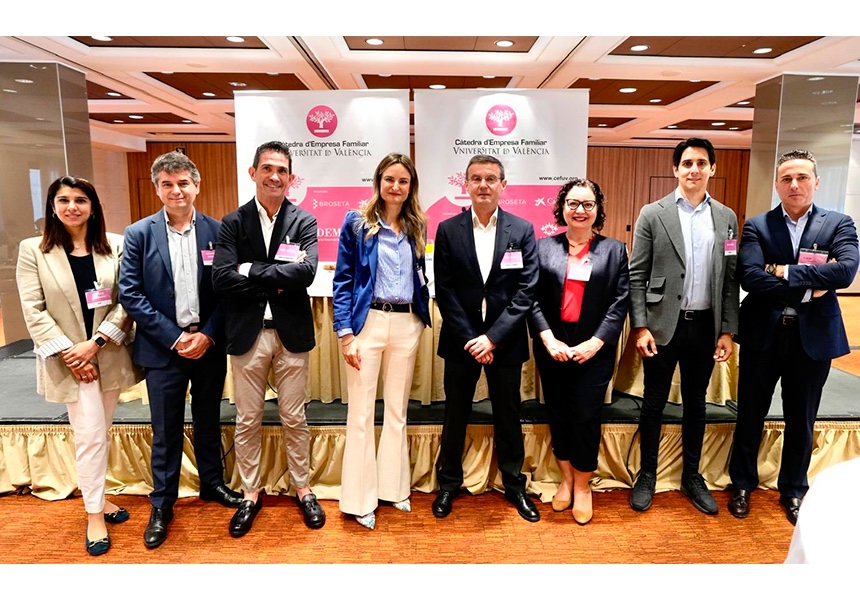
Valencia, 21 May 2025. Under the title ‘Guests at home: the challenge of running a family business without being family’ the Chair of Family Business of the University of Valencia (CEFUV), promoted by the Valencian Association of Entrepreneurs (AVE), EDEM School of Entrepreneurs, the Valencian Institute for the Study of Family Business (IVEFA), the Institute of Family Business (IEF) and the University of Valencia (UV), and with the collaboration of CaixaBank and Broseta, has held a new breakfast-tertulia.
The meeting brought together two professionals who lead family businesses without being part of the founding core: Mª Ángeles Bartolomé, Managing Director of Grupo Ballester, and Raúl Martin, CEO of Familia Martínez, who shared their experience moderated by Juan Nabás, CEFUV researcher and professor at EDEM.
During the colloquium, they addressed the challenges and opportunities involved in leading a family business without being part of the founding family, a situation that is becoming increasingly common in today's business context.
Connecting with the corporate culture
Both speakers agreed that one of the main challenges when taking over the management of a family business is to thoroughly understand its history, its values and its way of doing things. The incorporation of external profiles can be a way of professionalisation, but it requires a respectful integration with the existing culture.
Mª Ángeles Bartolomé explained that her initial challenge was to bring in an external vision without blurring the essence of the company: ‘A family business must become more professional, but without losing its roots’. To achieve this, he stressed the importance of spending time with the owner family, understanding their legacy and aligning with their long-term goals.
Building trust, step by step
Both Bartolomé and Martín agreed that trust is not imposed, but earned on a day-to-day basis. In their experience, the moments of greatest pressure are often decisive in consolidating the relationship between professional management and ownership.
In Raúl Martín's words, ‘I am a hinge between the company and the family; trust is earned little by little throughout the process’. He stressed that this type of leadership requires being on both sides, understanding business logic without losing sight of family motivations.
From instinct to process: purpose and professionalization
Speakers also addressed the need to evolve from management based on intuition - common in the first generations - towards more structured models. This step, they pointed out, should not imply a break with the past, but rather a conscious adaptation to new contexts.
In the case of Familia Martínez, this evolution translated into the reformulation of its purpose. According to Martín, ‘the concept of family is implicit in the way we do things and the way we relate and develop. Our vision is to improve people's daily lives through food and, to this end, our essence as a family business guides us in aspects such as doing things well, respecting people, and the ambition to improve by taking care of all the members of our great family’.
Leadership with sensitivity and attunement
From their respective backgrounds, both stressed that the key to successfully leading a family business without belonging to it is to act with sensitivity, patience and a deep understanding of the legacy they represent. They also agreed on the need to build relationships based on harmony and respect for the history and values of the founding family.
Mª Ángeles Bartolomé emphasised the responsibility involved in leading a family business without being part of the founding family. She explained that ‘being CEO of a family business without being part of the family means taking over the management with the responsibility of maintaining and extolling the legacy it possesses’. In his opinion, knowing the history of the company is fundamental to assume it as one's own and to transfer this sense of belonging to the rest of the team. ‘My partners don't want dividends, they want a legacy,’ he said, underlining the importance of preserving the essence of the project as opposed to a purely financial vision. For Bartolomé, this shared commitment is what makes human capital the real driving force of the organisation.
Beyond the numbers: the differential value of family businesses
In the final part of the meeting, Raúl Martín wanted to highlight the fundamental role that family businesses play in the economic and social fabric of the country. In his opinion, their contribution goes far beyond financial results: ‘Both their essence and their value and social impact are key to the development of our country’, he said.
For her part, Mª Ángeles Bartolomé stressed that profitability in this type of organisation is not measured exclusively in economic terms. She highlighted the importance of intangible factors such as the historical value of the business, the uniqueness of the asset, the link with the client or the user experience, elements which, she pointed out, do not always have the same weight in non-family businesses.
Cultural integration and professionalisation: a necessary balance
Finally, the researcher Juan Nabás focused on the importance of an effective integration between external management and the culture of the family business. He pointed out that, ‘when a professional from outside the family business brings solid training, diverse experience and complementary skills, his or her contribution can be decisive for the growth and professionalisation of the family business’. However, he stressed that this contribution will only be effective if it is accompanied by a real commitment to the values and objectives of the organisation: ‘For this integration to be truly successful, it is essential that the professional shares and integrates the company's own values, and is committed to its economic and non-economic objectives, understanding the purpose and identity that characterise this type of organisation’.
The event highlighted the importance of professional management committed to the founding values of the family business, as well as the need to advance in its professionalisation without losing its essence.








